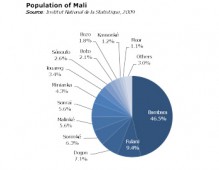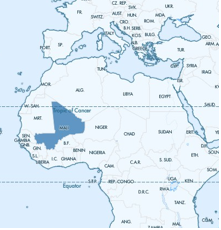Summary of the Historical Background and Current Alliances
A minority group (MNLA) is seeking independence for an ethnic minority (Tuareg) that doesn’t want it, on a piece of land that it has never owned (or ruled) at any point of time in history, in the midst of much larger communities that were never consulted on the matter.
Some have insinuated that the French colonial powers were responsible, at the time of the independence of Mali, for drawing its map so as to include the lands occupied by the Tuaregs. The Mali Empire was at the origin of building Timbuktu into a city of learning. Its successor, the Songhai Empire covered all the territories in present day Mali and much more. This propaganda is thus utterly uninformed or vicious incorrect affirmation. The Songhai and several other ethnic groups in Mali have occupied the north of Mali from times immemorial to present. The work of the Mali and Songhai empires in the 14th to the 16th centuries suffices to dispel any myth of French misdeeds in this matter – when French colonization only started in 1880. The wars and atrocities are the actions of a very small and self-appointed minority.
The MNLA propoganda tries to seperate the MNLA from the other jihadist groups such as the Ansar Dine who are currently imposing sharia law in northern Mali. This is an attempt to attract international sympathy for their seperatist claims. In fact the groups are acting together and cannot be seperated. This includes AQIM and the drug smugglers.
Here’s a link to a Human Rights Watch report: Mali: War Crimes by Northern Rebels issued on April 30, 2012.
The Crisis in Northern Mali
Updated: May 8th 2012
This statement was published by MaliWatch, http://www.maliwatch.org * aksdialaka@gmail.com * (404) 939-2831
Download
Situation on the ground
The Northern half of Mali is currently outside of the control of the central government; the area (roughly the size of Texas) consists of 3 administrative regions: Gao, Timbuktu and Kidal. The 3 regions are under the effective control of Ançar Dine (a salafist group seeking to bring Taliban-style Islam to the entire country), MNLA (Mouvement National de Liberation de l’Azawad, a Tuareg-dominated group seeking independence of the 3 regions from Mali), FNLA (Front National de Liberation de l’Azawad, an Arab-dominated group seeking to defend its own community), AQIM (Al Qaida in Islamic Maghreb, a group affiliated to Al-Qaeda), MUJAO (Mouvement de l’Unicité et le Jihad en Afrique de l’Ouest, a splinter group from AQIM) and Boko Haram (a Jihadist organization based in Northern Nigeria and seeking to implement Sharia law). Ançar Dine dominates in most cities, while MNLA troops are mostly camped outside the cities. FNLA is opposed to both Ançar Dine and MNLA, while the other groups (AQIM, MUJAO and Boko Haram) work in tandem with Ançar Dine.
Fighting started in mid January 2012; several towns and army garrisons were attacked by MNLA, later joined by Ançar Dine at the end of January. They occupied several military outposts and most significantly the army’s air base of Tessalit; they mostly stayed away from fortified cities until the last week of March 2012. On March 22nd, a group of junior military officers staged a coup d’état in Bamako and overthrew the elected government. This coup immediately created turmoil in military garrisons all over the North; junior officers took over command and arrested senior officers. The rebels launched attacks against the 3 regional capitals (Kidal, Tombouctou and Gao); by April 2nd, they occupied all 3 cities; the Malian army was overrun and retreated south to Sévaré (Mopti).
In this multi-ethnic country where dozens of groups have lived together for centuries, this crisis has shaken the entire nation to its core. People seeking shelter away from fighting have fled the country by the tens of thousand. Averting a humanitarian crisis is of critical importance. Ançar Dine and the MNLA have prime responsibility in this human tragedy.

Points of Clarification
(1) The majority of Tuareg people do not support the MNLA and its goals of independence
According to press reports, MNLA’s membership is anywhere between 1000 to 3000 mostly former mercenaries from Kaddafi’s Libyan army; the majority of Tuareg people in Mali consider themselves Malians; although, no polls currently exist, Tuareg community leaders have continuously voiced their opposition to MNLA goals. There are currently more than 310,000 refugees and internally displaced people fleeing fighting initiated by MNLA attacks in Saharan towns and hamlets.
(2) Tuareg represent 32% of the population in the North of Mali
The MNLA wants independence for Touaregs in the 3 northern regions (Gao, Kidal and Timbuktu) even though Touaregs represent only 32% of the population. Several ethnic groups live in the north of Mali; in addition to the Tuaregs, there are Sonrais, Fulani, Arabs, Moors, Bambara and many other smaller groups who have lived there for centuries. Together these other groups represent 68% of the population of the 3 administrative regions claimed by the MNLA. This so-called fight for independence is for the benefit of a minuscule well-armed group of people (a few thousands at most) within an ethnic minority.

(3) What’s happening in Northern Mali has nothing to do with Independence
The fight in Mali has nothing to do with independence; all it has brought to the region is more poverty and desolation. These groups are seeking to transform the region in a no-man’s land where banditry, kidnapping and drug trafficking will become law of the land. Mali’s neighbors are all aware of this and no country in the world has recognized this so-called independent state of Azawad. What these various groups have managed to do is to turn the regions into a safe haven for jihadist and salafist groups intending to create mayhem.
(4) Humanitarian Catastrophe
Drought and poor rains in 2011 had already created food shortage in the Sahel region. The current crisis – with population fleeing combat zones – will worsen the humanitarian crisis. Farmers will undoubtedly miss the planting season in 2012 if the conflict continues, creating a dependency on outside food aid; something that had not happened in many decades.
(5) Atrocious Crimes are now being committed in Northern Mali
 On January 24 2012, MNLA and Ançar Dine jointly overran an army post at Aguelhok about 80mi north of Kidal; 82 soldiers and civilians were massacred; throats slit open and summary executions. The former French development minister Henri de Raincourt said at the time “There was absolutely atrocious and unacceptable violence in Aguelhok. There were summary executions of soldiers, civilians.” “There’s talk of around 100 who were captured and killed in cold blood,” he added, saying the tactic “resembled that used by Al Qaeda”. As cities and towns felt to MNLA and Ançar Dine, reports of abduction and rapes surfaced; the United Nations Special Representative on Sexual Violence in Conflict said “As unrest continues in northern Mali, an alarming number of acts of sexual violence have been reported. Allegations include abductions, public rapes and subjecting women and girls to acts of sexual violence in front of family members.” More recently Human Right Watch issued its own report describing the abduction of girls (and young as 14) and women for sexual violence, recruitment of child soldiers, looting, pillaging and attacks on hospitals . Rebel groups have also started the destruction of religious sites several hundred years old – classified as UNESCO as World Heritage Sites – acts that remind the destruction of the Bamiyan Buddha statues in Afghanistan.
On January 24 2012, MNLA and Ançar Dine jointly overran an army post at Aguelhok about 80mi north of Kidal; 82 soldiers and civilians were massacred; throats slit open and summary executions. The former French development minister Henri de Raincourt said at the time “There was absolutely atrocious and unacceptable violence in Aguelhok. There were summary executions of soldiers, civilians.” “There’s talk of around 100 who were captured and killed in cold blood,” he added, saying the tactic “resembled that used by Al Qaeda”. As cities and towns felt to MNLA and Ançar Dine, reports of abduction and rapes surfaced; the United Nations Special Representative on Sexual Violence in Conflict said “As unrest continues in northern Mali, an alarming number of acts of sexual violence have been reported. Allegations include abductions, public rapes and subjecting women and girls to acts of sexual violence in front of family members.” More recently Human Right Watch issued its own report describing the abduction of girls (and young as 14) and women for sexual violence, recruitment of child soldiers, looting, pillaging and attacks on hospitals . Rebel groups have also started the destruction of religious sites several hundred years old – classified as UNESCO as World Heritage Sites – acts that remind the destruction of the Bamiyan Buddha statues in Afghanistan.
Footnotes____________________________________________________________________________________________________________________________________
1. Based on a 2009 demographics study by the Institut National de la Statistique in Mali.
The nationwide study involved people age 6 and above. The data can be retrieved at http://www.nada.instat.gov.ml/rgph2/index.php?fichier_a_appeler=demographie.php
2. http://www.telegraph.co.uk/news/worldnews/africaandindianocean/mali/9191760/Triumphant-Tuareg-rebels-fall-out-over-al-Qaedas-jihad-in-Mali.html
3. http://www.chicagotribune.com/news/nationworld/la-fg-mali-tuaregs-20120404,0,7023908.story
4. http://www.unhcr.org/4f7acfc73.html
5. See footnote 1
6. http://www.abc.net.au/news/2012-02-14/tuareg-execution-claim/3828062
7. http://www.un.org/apps/news/story.asp?NewsID=41734
8. http://www.hrw.org/news/2012/04/30/mali-war-crimes-northern-rebels
9. http://www.washingtonpost.com/world/africa/residents-al-qaida-linked-group-attacks-tomb-classified-as-unesco-site-in-malis-timbuktu/2012/05/06/gIQA3u0d5T_story.html






